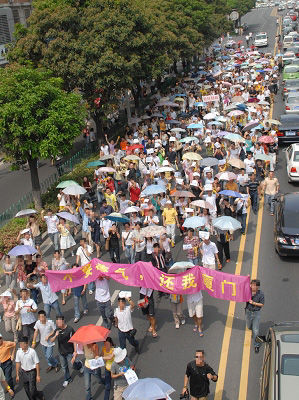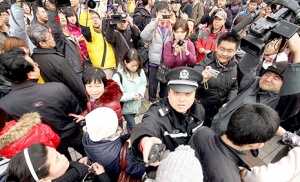Take a walk
来自China Digital Space
散步 (sànbù): take a walk
A new form of resistance. In China, it is difficult to strike, applications for protests are routinely denied, and petitioning the government often brings dire consequences. As such, workers and citizens have adopted new methods that tread the fine line of legality.
Protesters in Xiamen began “taking walks” in 2007 to protest the construction of a polluting paraxylene (PX) processing plant. In February 2011, an online source attempted to stage a “jasmine revolution” by organizing groups to “walk” the central Beijing shopping district of Wangfujing.
In 2014, a series of state-led anti-Christian campaigns to demolish churches and remove crosses generated fierce resistance amongst Chinese Christians. Taking a walk is one of the tactics that Christian groups are evoking to defend their religious freedom:
Liaomulinchuandao (@廖木林传道): If Zhejiang authorities do not immediately stop the illegal removal of crosses, tens of thousands of Christians will put on protest t-shirts and voluntarily take a walk on the streets to protect their rights. We will hold protest signs to express our voice to the entire world. (July 15, 2014)
浙江当局若不尽快停止非法拆十架,基督徒集体维权,自发式几万人身穿抗议体恤衫街头散步;街头手拿抗议标语向全世界表达心声已成为可能 [Chinese]
Yu Jianrong, a researcher at China’s Academy of Social Science known for his social activism, gives a vivid description of this method:
Workers’ methods of resistance include petitioning higher levels of government, sit-ins, strikes, demonstrations, and blocking traffic. Two extremely important recent methods of resistance include “taking a walk” and “going sightseeing.” (PowerPoint slide) Take a look, these are workers from Baoding “taking a walk” to Beijing on April 3, 2009. It is 137 kilometers from Baoding to Beijing. When I learned the news (of the workers’ “walk”) and rushed over, they were almost at the Xushui County toll station. At the time Beijing was very tense; Shijiazhuang was very tense; Baoding was very tense. A lot of people and workers were sent to negotiate; they said, “You can’t go to Beijing like this.” The workers answered by saying, “Is there a problem with us going to Beijing to go sightseeing? There’s nothing wrong with it. What law says we can’t go to Beijing to do some sightseeing?” Those (sent to) persuade them said, “You can’t all of you go to Beijing to go sightseeing.” The workers immediately responded, “And what law exactly says that this many people can’t go to Beijing to do some sightseeing?” Those sent to persuade them against going insisted, “In any event, you can’t all walk to Beijing to go sightseeing like this.” The workers said, “We don’t have any money, why can’t we walk to Beijing?” The situation was extremely tense. Finally, the Baoding City (government) had no choice but to state right there to the workers, “We’ll resolve all your problems.” The workers said, “We don’t have any problems. Our only problem is a sightseeing problem. Look for yourselves, we haven’t brought materials to petition the government, we’re not shouting slogans, we don’t have any problems, we’re not petitioning the government, we’re not lodging complaints. We are going sightseeing.” In the end, their actions at the scene caused their company’s chairman of the board to be taken away (by the police). Only then did they return. [Source]






